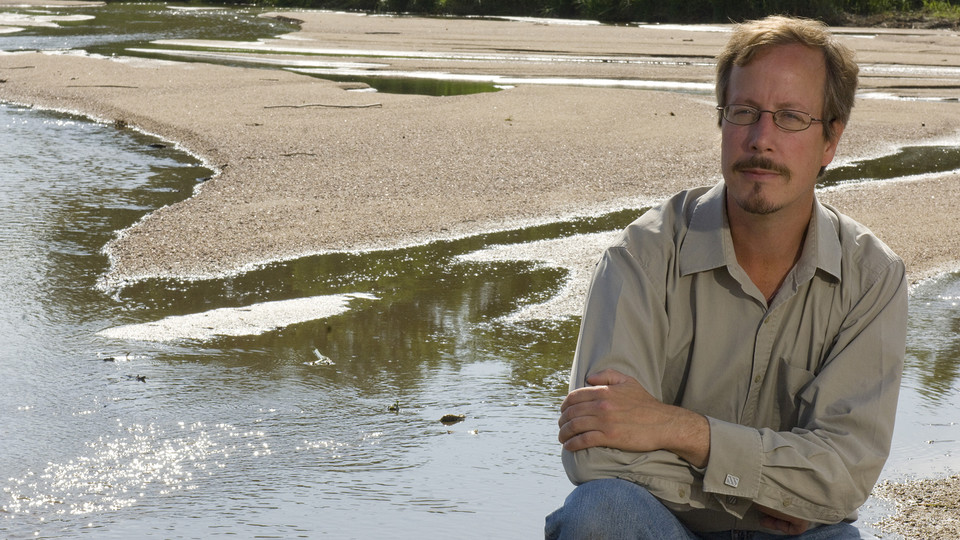
After more than 20 years working for federal natural resources agencies, most recently as a research scientist and leader of the Nebraska Cooperative Fish and Wildlife Unit, Craig Allen will retire March 31.
An informal reception to celebrate COOP Unit leadership changes and Allen’s retirement, called the “Coop Adaptive Cycle Celebration” after the unit’s work in resilience theory, will be from 1 to 2:30 p.m. April 1 in Hardin Hall.
“I work with a theory that explicitly addresses cycles of collapse and renewal, which suggests that those cycles are critical to maintaining resilience,” Allen said. “This is my personal adaptive cycle.”
That doesn’t mean the change is an easy one to make. Allen got his professional start working for the federal government while studying at the University of Florida. At the time, he was conducting research for free on imported fire ants for the U.S. Department of Agriculture Agricultural Research service.
“I was collaborating with them on side projects while working on my Ph.D. and asked them if they liked my work so much why didn’t they pay me: To my complete surprise, they did,” he said.
Post degree, and after a two-month post-doctoral position, he became the assistant unit leader of the South Carolina Cooperative Fish and Wildlife Unit and eventually took over as the unit leader. In 2004, Allen moved to Nebraska to help found the COOP unit here.
“The first time I saw the announcement for the Nebraska position, I ignored it, even though I was looking to move on, because, like many, I had the mental image of Nebraska as a giant flat corn field,” he said. “Then I looked more closely.”
What he found was a state with wild landscapes and dedicated partners in the university; the U.S. Geologic Survey; the Nebraska Game and Parks Commission; the U.S. Fish and Wildlife Service; and the Wildlife Management Institute, all groups willing to collaborate on meaningful research. With support from those state and federal agency partners, he was able to help foster the COOP Unit’s growth from a staff of two (Allen and administrative assistant Valerie Egger) to a staff of eight, with 25 graduate students, and 100 temporary summer workers.
“We were lucky to have great support from all our cooperators, and were able to grow rapidly,” he said. “We went from a complete unknown to a significant conservation and management research program.”
“Of all the states I’ve been in, Nebraska is the most collaborative, and partnerships have been relatively easy to develop,” he added.
That’s been a benefit for students who’ve studied with the COOP unit. They’ve been able to develop networks with professionals, learn how universities work, and also how state and federal agencies function. It has helped them land jobs in careers they love and make names for themselves in the natural resources field.
Still, some students made names for themselves in other ways.
“With the number of students and collaborators we have had over time, there are all kinds of stories,” Allen said. “But one student made the news after selling a Jesus-shaped potato on eBay for $10,000. I grew wary of phone calls from reporters starting ‘Do you know (student name)?’”
It was part of the fun, though, and also a part of the challenge of building a unit from the ground up, a rewarding experience overall. What started with one research project investigating tree-removal projects across the state, grew into a unit able to land large National Science Foundation grants funding up to 20 graduate students at a time, doing a diversity of work.
He doesn’t take credit for the success.
“The success is owed to all our partners, staff and students,” he said. Without such a strong conservation community that works so well together, it wouldn’t have happened.
That’s why leaving his post is harder than he expected.
“I was hosting a workshop (in late March) with resilience folks and neuroscientists, and a colleague told me I looked sad,” Allen said. “I realized I was a bit – it’s hard to lose a significant part of your identity – part of the COOP Unit is who I’ve been for two decades.”
It's also why a vacation to Portugal with his son is planned for after his retirement goes into effect. He’ll have a chance to relax and reboot and look to the future and possibly decide, “What’s next?”
About that, all he has to say is, “We’ll see.”
Shawna Richter-Ryerson, Natural Resources